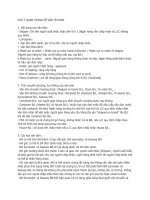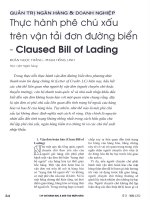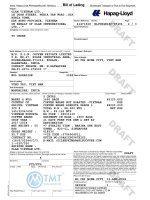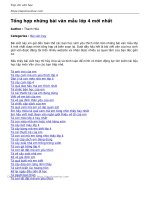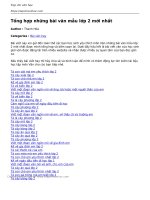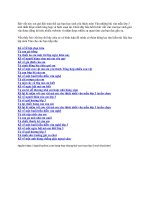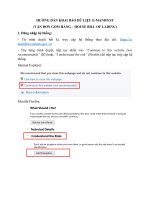Mau van don moi nhat bill of lading (1)
Bạn đang xem bản rút gọn của tài liệu. Xem và tải ngay bản đầy đủ của tài liệu tại đây (107.97 KB, 3 trang )
XXXXXXXXXXXX SHIPPING COMPANY
TERMS AND CONDITIONS OF CARRIAGE
1.Defination
Carrier mean the party on whose behalf this Bill of Lading has been signed “Merchant” includes the chatterer, the
shipper, the receiver, the consignee, the holder of this Bill of Lading and the owner of the goods. “Ship” includes any
vessel owned, chartered or operated by the carrier used in the performance of the contract evidenced by this Bill of
Lading carriage includes the river part of route, if any.
2.Paramount clause
This Bill of Lading shall have effect subject to the Vietnamese maritime code approved by the National assembly of
the socialist republic of Vietnam on 30th June,1990 and any amendment and modification there of however, in case
this Bill of lading is issued in the country where the National law requires that the contract evidenced by this Bill of
Lading shall take effect subject to the International. Convention for the Unifications of certain rules relating to Bills of
Lading signed at Brussels on 25th August 1924 (the Hague rules arteries I to VIII) or Hague rules shall compulsorily
apply to the contract evidenced by this Bill of Lading. Neither the Hague rules nor the Hague/Visby rules shall apply to
this contract where the goods carried Hereunder consist of live animals or cargo which by this contract is stated as
being carried on deck and is so carried.
Nothing Herein contained shall operate to limit or deprive the carrier of any statutory protection from or limitation of
liability afforded to the carrier by laws or regulations of any country.
For the River part of route which is not considered by virtue of status as navigable areas, the carrier’s liability and
immunity will be governed by any law or regulation’s applicable to the carriage of goods by river of the country or
territories where aforesaid river part of route passes, but in any case the carrier’s liability is limited as fixed in the code
or law mentioned in (A) and (B).
3.Jurisdiction
Any dispute arising under this Bill of Lading shall be to the court or arbitration in Vietnam in accordance with the rules
of procedure of the said court or arbitration and the Vietnamese maritime code 1990 shall apply except as otherwise
provided elsewhere herein.
4.Period of Responsibility
Goods in the custody of the Carrier or his Agents or servants before loading and after discharge, whether being
forwarder to or from the vessel or whether awaiting shipment, landed or stored, or put into hulk or craft belonging to
the Carrier or not, or pending transshipment at any stage of the whole transport, are in such custody at the sole risk and
expense of the Merchant and thus the Carrier has no responsibility whatsoever for the goods prior to the loading on and
subsequent to the discharge from the vessel.
5.The Scope of Voyage
The contract is for liner service and the voyage herein undertaken shall include usual or customary or advertised ports
of call whether named in this contract or not, also ports in or out of the advertised, geographical, usual or ordinary route
or order, even though in proceeding thereto the vessel may sail beyond the port of discharge or in a direction contrary
thereto , or depart from the direct to customary route. The vessel may call at any port for the purpose of the current
voyage or of a prior or subsequent voyage. The vessel may omit calling at any port or ports whether scheduled or not,
and may call the same port more than once: may, either with or without the goods on board, and before or after
proceeding towards the port of discharge, adjust compasses, dry-dock, go on ways or to repair yards, shift berths, under
go degaussing, wiping our similar measure, take fuel or stores, land stowaways, remain in port, sail without pilots, tow
and be towed, and save or attempt to save life or property, and all of the forgoing are included in the contract voyage.
6.Substitution of Vessel, Transshipment and Forwarding.
The Carrier has the right, but no obligation, to carry the goods to their destination by any other vessel or vessels, either
belonging to the Carrier or not, than the vessel named herein, or by land or air transport, proceeding either directly or
indirectly, and may carry the goods or part of them beyond their destination and may transship, land and store the
goods either on shore or afloat and reship or forward the same at Carrier’s expense but at Merchant’s risk, also may
convey the goods in lighters to and from the vessel at Merchant’s risk. In all cases of transshipment, forwarding,
reshipment or storage, the Carrier acts as agent for the Merchant only, and in authorized to accept the terms of any
warehouseman or carrier, even although less favorable to the Merchant than those contained in this Bill of Landing.
The responsibility of the Carrier shall be limited to the part of the transport performed in his own vessel or vessels and
the Carrier shall not be liable for damage and/or loss arising during any other part of the transport, even although the
freight for the whole transport has been collected by him. The carrier may arrange, forwarding a vessel or conveyance
in his own service or with which he has established connections.
7. Lightrage.
Any lightering in or off ports of loading or ports or discharge to be for account of the Merchant.
8.Loading, discharge and delivery of goods.
In regard to loading and discharge this Bill of Lading is subject to the terms, condition and exceptions of the contract of
freightment according to which it is issued. In the absence of such an agreement the goods are received and delivered
under ship’s tackle.
If the Merchant fails to take receipt of the goods stipulated above the contract of carriage shall be considered as having
been fulfilled and the Carrier shall be at liberty to put the goods into craft and/or land on the quay and/or storing, etc.,
as the Carrier may think fit at the expense and risk of the Merchant. In this event the Carrier shall have the right to
claim demurrage and/or discharge and store the goods as set out above.
9.Options.
The port of discharge for optional cargo must be declared to the vessel’s Agents at the first of the optional port not later
than 48 hours before the vessel’s arrival there. In the absence of such declaration the Carrier may elect to discharge at
the first or any other optional port and the contract of carriage shall then be considered as having been fulfilled. Any
option can be exercised for the total quantity under this Bill of Lading only.
10.Notification.
Any clause herein giving names of parties who desire to be notified of ship’s arrival at destination is solely for the
information of ship’s agents and failure to notify shall not involve the Carrier in any responsibility, or relieve the
Merchant from any obligation hereunder.
11.Perishable and gargle goods.
Fish, fruit, vegetables, glass, crockery, castings, and all other goods of a perishable or fragile nature are carried at the
sole and entire risk of the Merchant, unless the Carries has not exercised due diligence.
12.Deck cargo, live animals and Plants.
Live animals, deck cargo and plants (if stated herein to be so carried) are received and carried at Merchant’s risk: the
Carries and/or the Ship shall be under no responsibility for any loss thereof or damage thereto, and any warranty of
seaworthiness in the premises is hereby waived; except as just stated such shipments shall be subject to all the terms
and provisions in this Bill of Lading, relating to goods. Live animals, deck cargo and plants must be taken by Merchant
from the Ship immediately on arrival. Otherwise the Carries to be at liberty to land the same at Merchant’s risk and
expense.
In particular, but not by way of limitation, Carrier and/or Ship shall not be responsible for disease, mortality, contagion
or injury of livestock.
13.Fumigation.
In the event of fumigation of vessel and/or cargo for whatever reason, the Carrier shall no liable for damage to cargo
without actual proof of negligence of the Carrier which shall not be presumed against him.
14.Dangerous and Contraband goods.
If any goods of an explosive, inflammable, corrosive, damaging or dangerous nature be shipped without previous
written declaration and arrangement or any goods contra banded or prohibited by the law of the port of shipment,
discharge or call, whether the Merchant is aware thereof or not, such goods, upon discovery, may be rendered
innocuous, thrown overboard, or be discharged at any port, or be otherwise dealt at the Carrier’s discretion, and the
loss, as well as any consequential loss, penalty or damage to the ship or goods, or any responsibility whatsoever shall
fall upon the Merchant, including the cost of handling lightrage and all other expenses incurred in disposing of such
goods and in complying with the orders or rules of port or other government authorities with respect thereto.
It’s further mutually agreed that if any such good shipped with such previous declaration and arrangement shall
become a danger to the ship or goods, they may in like manner be discharged at any place or destroyed or rendered
innocuous or thrown overboard without any responsibility on the part of the Carrier, any consequential loss, penalty or
damage to the ship or goods or any responsibility whatsoever shall fall upon the Merchant.
15.Heavy and Awkward Goods.
a-Marking, Packages, pieces, bundles, or units which weigh one ton or more each shall be clearly marked by the
Merchant with the weight, in case of any damage or loss resulting to the ship or any property whatsoever or in case of
any claim whatsoever against the Carrier, owing to incorrect weight having been declared or failure to mention with
paint the exact weight, the Merchant shall be responsible for such loss or damage.
b-Single pieces or packages exceeding 2 tons gross weight or 12 meters in length. The extra expenses and the risk of
handling, loading, slowing (e.g. bedding checking and lashing), restoring, transshipping and discharging of such goods
as well as the expenses of shifting the ship and of use cranes etc., shall be for account of the Merchant.
16.Lumber, Timber, Plywood, Iron, Steel or Outlier Metal Products.
Any description in this Bill of Lading to the effect that the goods mentioned in this clause have been shipped in
apparent good order and condition does not involve any admission by the Carries as to absence of such possible
affection, as the case may be, to the case may be, to the external aspect of the goods whether resulting from their own
nature or not, as chaffing, shake, split, discoloration, stain, moulds, warps, dent, bent, rust, oxidation or other
deterioration, for all of which the Carrier shall not be held responsible.
17. Bulk Cargo
As the Carrier has no reasonable means of checking the weight of bulk cargo any reference to such weight in
this Bill of Lading shall be deemed to be for the convenience of the Merchant only but shall constitute in no
way evidence against the Carrier.
18. Valuable Goods
The Carrier shall not be responsible to any extent for any loss of, or damage to, or in connection with any
precious metals, stones or chemical, currency of all kinds, valuable documents, works of art or curious, or any
valuable goods of any amount whatsoever, unless their packing have been secured properly and the nature and
valuable thereof declared in writing by the Merchant before shipment and so inserted in Bill of Lading and ad
valorem freight paid.
19. Automobile and other unpacked goods
The term apparent good order and condition when used in this Bill of Lading with reference to automobiles,
rolling stocks, tractors, machinery and all other unpacked goods does not mean that goods when shipped on
board were free of visible bent scratch, hole, out and/or bruise.
It in mutually understood and agreed that such goods mentioned in the preceding paragraph shall be constituted
insufficiency of packing and the Carrier shall in no ever be held responsible for loss and/or damage resulting
there from.
20. Freight and Charges.
a-Freight to be paid in full without discount. Freight, whether prepaid or payable at destination, to be
considered as earned upon shipment and not to be returned or relinquished, vessel and/or goods loss or not
loss. The Carrier’s claim for any charges for which the Merchant is able under this contract shall be definitely
payable in like manner as soon as the charges have been incurred. Freight payable as destination and charges,
if any, shall be paid latest against delivery of the goods. Interest at 5 percent shall run from the date when
freight and charges are due.
b-Freight and all other amounts mentioned in this Bill of Lading are to be paid in the currency named in the
Bill of Lading or, with the consent of the Carrier, in other currency at the highest rate of exchange for bankers
sight bills current for prepaid freight on the day of loading, and for freight payable at destination on the day
when the vessel is entered at the Custom House or on the day of the withdrawal of the delivery order,
whichever the higher.
c-The Merchant shall be liable for expenses of fumigation and of gathering and sorting loose cargo and of
weighing onboard and expenses incurred in repairing damage to and replacing of packing due to excepted
causes and for all damager caused extra handling of the cargo for any of the aforementioned reasons.
d-Any duties, dues, taxes and charges which under any denomination may be levied on or in connection with
the cargo on any basis such as amount of freight, weight, of cargo or tonnage of the vessel shall be paid by the
Merchant.
e-The Merchant shall be liable for all times and/or losses which the Carrier, vessel or cargo may incur in
connection with the cargo through inobservance of Custom House and/o import or export regulation.
f-The Carrier is entitled in case of incorrect declaration of contents, weights, measurements or value of the
goods to claim double the amount of freight which would have been due if such declaration had been correctly
give. For the purpose of ascertaining the actual facts, the Carrier reserves the right to obtain from the Merchant
the original invoice and to the contents inspected and weight, measurement or value verified.
g-If the currency in which freight and charges are quoted is devalued between the day of the freight agreement
and the date when the freight and charges are paid then all freight and charges shall be automatically and
immediately increased equivalent to the extent of the said currency.
21. Lien.
The Carrier shall have a lien on the goods for any amount due this contract and for costs receiving same and
shall be entitled to sell the goods privately or by action to cover any claim. If on a sale of the goods, the
proceeds fail to cover the amount due and the cost and expensive incurred, the Carrier shall be entitled to
recover the difference from the Merchant
22. Delay in Delivery.
The Carrier is not liable for any loss or damage sustained by the Merchant in consequence of any delay in the
delivery of the cargo. Delivery of originally missing cargo can take place at all time.
23.General Average, Salvage, Amended Jason Clause
a-General average to be adjusted at any port or place at Carrier’s option by an average adjuster appointed by
him and to be settled according to the York-Antwerp Rules 1974. For this purpose the Merchant is bound to
declare, if required, the value of the goods.
b-Such deposit as the Carrier or his Agent, without prejudice may deem sufficient to cover the estimated
contribution of the goods and any special charges therein shall, if required, be paid to the Carrier or his Agent,
prior to delivery and will be placed on trust account in bank in joint name of the Carrier and of trustee the
Merchant.
c-In the event of accident, danger, damage or disaster before or after commencement of the voyage resulting
from any cause whatsoever, whether due to negligence or not, for which or for the consequence of which the
Carrier is not responsible by statue, contract or otherwise, the Merchant shall contribute with Carrier in
General average to the payment of any sacrifice losses, or expenses of a General Average nature that may be
made or incurred and shall pay salvage and special charges incurred in respect of the goods. If a salving vessel
is owned or operated by the Carrier, salvage shall be paid for as full as if the salving vessels belonged to
strangers.
24. Both To Blame Collision Clause
a-If the vessel comes into collision with another vessel as a result of the negligence of the other vessel and any
act, negligence or default of the Master Mariner, Pilot or the servants of the Carrier in the navigation or in the
management of the vessels, the Merchant will indemnify the Carrier against all loss or liability to the or noncarrying vessel or her Owner in so far as such loss or liability represents loss of or damager to or any claim
whatsoever of the Owner of the said goods paid or payable by the other or non-carrying vessel or her Owner to
the Owner of the said cargo and set-off or recovered by the other or non-carrying vessel or her Owner as part
of his claim against the carrying vessel or Carrier.
b-The foregoing provisions shall also apply where the Owner, operator or those in charge of any vessel or
objects other than, or in addition to the colliding vessel or object are at fault in respect of a collision or
contract.
c-This clause to remain in effect even if unenforceable in the Courts of the United of America.
25. Government directions, War, Epidemics, Ice, Strikes, Etc…
a-The Master and the Carrier shall have liberty to comply with any other or directions or recommendations in
connection with the transport under this contract given by any Government or Authority, or any body acting or
purporting to act on behalf of such Government or Authority, or having under the terms of insurance on the
vessel the right to give such other or directions or recommendations.
b-Should it appear that the performance of the transport would expose the vessel or any goods on board to risk
of seizure or damage or delay, resulting from war, warlike operations, blockade, riots, civil commotions or any
person on board to the risk of loss of like or freedom, or that any such risk has increased, the Master may
discharge the cargo at port of loading or any other safe and convenient port.
c-Should it appear that epidemics, quarantine, ice, labor troubles, labor obstructions, strikes, lockouts, any of
which onboard or on shore difficulties in loading or discharging would prevent the vessel from leaving again,
all of which safely and without delay, the Master may discharge the cargo at the port of loading or any other
safe and convenient port.
d-The discharge under the provisions of this clause of any cargo for which a Bill of Lading has been issued
shall be deemed due fulfillment of the contract. If in connection with the exercise of any liberty under this
clause any extra expenses are incurred, they shall be paid by the Merchant in addition to the freight with return
freight, if any, and reasonable compensation for any extra services rendered to the goods.
e-If any situation referred to in this clause may be anticipated, or if for any such reason the vessel cannot safely
and without delay reach or enter the loading port or must under go repair, the Carrier may cancel the contract
before the Bill of Lading is issued.
f-The Merchant shall be informed if possible.
26-Identity of Carrier
The contract evidenced by this Bill of Lading is between the Merchant and the Owner of the vessel named here
in (or substitute) and it is therefore agreed that said Ship owner only shall be liable for any damage or loss due
to any breach or non-performance of any obligation arising out of the contract of carriage, whether or not
relating to the vessel’s seaworthiness. If despite the foregoing, it is adjudged that any other is the Carrier and/
or bailee of the goods shipped here under, all limitations of, and exonerations from liability provided for by
law or by this Bill of Lading shall be available to such other.
It is further understood and agreed that as the Line, Company or Agents who has executed this Bill of Lading
for and liability arising out of the contract of carriage, not as Carrier or bailey of the goods.
XXXXXXXXXXXXXX SHIPPING COMPANY
Shipper :
BILL OF LADING
B/L N0
Consignee: ( If “ Order ” state the notify party ).
ADD: XXXXXXXXXXXXXXXXXXXX
HO CHI MINH CITY, VIETNAM
TEL : (84.X) XXXXXXXX FAX : (84.X) XXXXXXXX
Notify party : (Carrier not to be responsible for failure to notify see c1.10)
Place of Receipt
Port of Loading
/
Vessel/Voyage
Port of Discharge
Marks and Number
Place of Delivery
Measurement, m3 / Gross weight, kg
Quantity and description of goods
ABOVE PARTICULARS DECLARED BY SHIPPER
SHIPPED ON BOARD the above named ship in apparent good order and condition (unless otherwise stated) the goods or packages specified herein for carriage to the port of discharge or so hear
there to as the ship may safely get and lie always afloat and to be delivered in the like good order and condition at the aforesaid destination into consignees or their assigns.
The weight, measure, marks, numbers, quality, contents and value being particulars furnished by the Shipper are to be considered unknown to the carrier unless the contrary has been expressly
acknowledged and agreed to. The signing of this bill of lading is not to be considered as such an agreement.
In accepting this bill of lading the Merchant expressly accepts and agrees to all its stipulations, exceptions and conditions whether written, printed, stamped or otherwise incorporated as lull as if
they were all signed by the Shipper.
In witness where of the Master or Agent of the above named ship has signed the number of original bills of lading stated herein, all of this tenor and date, one of which being accomplished the
others to stand void.
FOR TERMS AND CONDITIONS OF CARRIAGE SEE OVERLEAF
FREIGHT AND CHARGES
Place and date of issue
As Agents For The Carrier
By
Number of original Bs/L
Freight payable at
Prepaid at
XXXXXXXXXXX SHIPPING CO.
